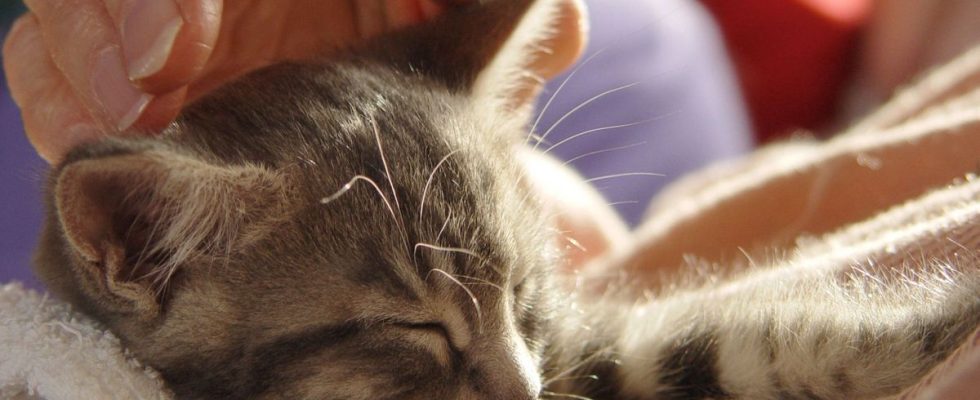Published on
Updated
Reading 2 min.
Dogs and cats bring comfort to their owners, yet pets are still rarely accepted in retirement homes. If the deputies would like their reception to become obligatory, the senators are more reserved.
It was unthinkable for André, 84, to enter a nursing home without Poupoune, his 15-year-old cat. At this possibility, tears came to his eyes. They were finally able to settle in together, in a room at the Galignani nursing home, in Neuilly-sur-Seine, near Paris.
The feline with its white and red fur stretches out on a cozy blanket, on the windowsill facing its master’s bed. Toys, scratching post, litter: “she lacks nothing“, underlines André, a former house painter, handing a treat to his protégé.
The director of this public establishment managed by the city of Paris agreed to welcome them, after checking that someone from André’s entourage would help him, if necessary, to take care of the animal.
“You have to experiment with everything that can bring joy to the residents, you just have to organize and anticipate well in advance what can be done.“, explains Dorothée Cheyrezy-Claude to AFP. She is part of a working group bringing together directors of Parisian nursing homes, public and private, to develop a charter defining the conditions for welcoming new residents with their animal in order to to standardize practices.
“Intolerable” abandonment
Currently, nursing homes are free to accept or refuse pets. LR MP Philippe Juvin wants to include in the “Aging Well” bill the right of elderly people to move into an establishment with their four-legged companion. “The nursing home must be a place of freedom equivalent to home“, he told AFP. “When you enter, it’s already a break, adding to that the forced abandonment of an animal is intolerable“.
Voted by the deputies, its amendment was however modified by the senators who are examining the text in plenary session from Tuesday: they wish to give control to the establishments.
For its part, the AD-PA, association of directors of nursing homes and home services, approves the proposal of MP Philippe Juvin.
“We must break with the security and health model of establishments, which leads to repressive measures.“, defends its president Pascal Champvert. The priority for him is to “respect the lifestyle habits of men and women” integrating a nursing home.
Especially since “older people have more difficulty adapting to change, they need benchmarks“, explains to AFP Isabelle Fromantin, nurse researcher, at the Curie Institute and Paris Est Créteil.
However, the pet is one, ensuring the “link” between the “life before” and the new existence: “he returns to him the same complicity, the same loyalty“, no matter the environment, she describes.
Provide a “framework”
When admitted to a nursing home, people are aged 85 on average, which however raises certain organizational questions regarding the animal. Who will take care of it if the master loses autonomy or ends up hospitalized?
“Solutions exist, the family can take over, volunteers can also come and help“, notes Reha Hutin, president of the 30 million friends Foundation, which has been campaigning for years for animals to enter nursing homes. “We must define a framework to avoid these cruel separations“, both for the owner and for the dog or cat, sometimes abandoned in shelters.
L’Terpta association proposes a new solution in response to the loss of autonomy of animal owners who live in nursing homes: the creation of a specific space in the establishment, capable of accommodating 18 animals, run daily by one of the employees and a volunteer. “It is about being the safety valve for the owner of the animal as well as for the nursing home“, specifies Fabienne Houlbert, founder of the association.
A pilot project will be carried out from May in a nursing home in Libourne, in Gironde.
